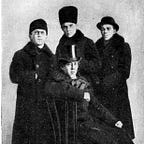On the Abstract: Saying the Quiet Part Out Loud
Last time I concluded that abstraction is ultimately making an unknown known by a biasness that guides our understanding of equivalency.
From a scientific perspective, this bias is equivalent to universal constants.
If something is constant, it cannot be dispensed.
Our understanding of equivalency can be dispensed but only by equivaluation.
What is being equivated?
We assume that within the universal constants there is a present moment.
“Past” and “future” moments describe moments that must/necessarily/need to be equaled to the present moment.
The present moment is the only condition that can validate everything that came before or anything that comes after.
The present moment is evident insofar as a consciousness is validated by it. The present moment validates the consciousness. The consciousness in turn can abstract from the present.
Our abstraction is coordinated by a bias inherent in the present moment, not our consciousness.
Where the inheritance is lost is during the act of abstracting.
As the consciousness is making judgments, it is making an unknown known.
The production of “known” is existential and practical.
What if we produce a known falsehood but try to pass it off as the truth?
Within the lie, there is evidence of bias. Others will know the lie when truth is accounted for without your personal bias and it cannot be recreated.
What if, in a Kafkaesque moment, the world seems to be lying to you.
The constant is now not just scientific-constants existing in a theory, but also constants regarding social hierarchy and power-dispersion-from-the-blessed-to-the-slaves.
What is being equated? Part of the present moment presents us with awareness. “I am a thing that thinks.” Thinking in nonhuman animals looks similar to our own, but ours are distinguished by an ability to “rectify/redeem/readdress/self-adjust” to aim towards different destinations.
That is, our thinking allows for the visualization of destinations. Maybe the universe is also thinking of where it’s going. Maybe we’re trying to equivate what the universe is looking for.
Regardless, there’s an equalization between the present moment and us having a destiny.
From a scientific perspective, destiny is complicated but can be simplified by “localized teleology” — Elements can serve a purpose/destiny but this purpose is found in closed systems where the purpose/destiny is inherent in the function of the element. For example, the teleology of water includes rain because there’s an atmosphere to be conductive for producing clouds.
The phenomena is also present in human-made closed systems.
For example, a lot of the teleology of automobile workers was eventually mechanized. Now the machines have the teleology/destiny that once automobile workers had.
The destinies between the machines and autoworkers is different. The autoworkers used the teleology as a source for their own abstraction concerning their personal lives, their families, their participation in the community. The machines don’t really have the same needs.
With the invention of the photo-camera, painting became more abstract/less practical for similar reason. The teleology of painting didn’t have to involve itself with photorealism because a machine could already do it better. The artists took the nihilism of being out of job to create creatively, without references outside coordination.
This creativity went on to teleologically expose our own psyche because, in interpreting these images, our own process of making unknowns known using our inherent bias to claim equivaluation, we expose our bias in a way communal-appraisal-of-photorealism can not.
Thus new biases are formed that paints bias as just another cog in the universe. To us, however, our bias is not just a cog. It’s a judgment about what the future should look like. And it’s a judgment of what history was. And these thing are real! Not just the result of some function?
